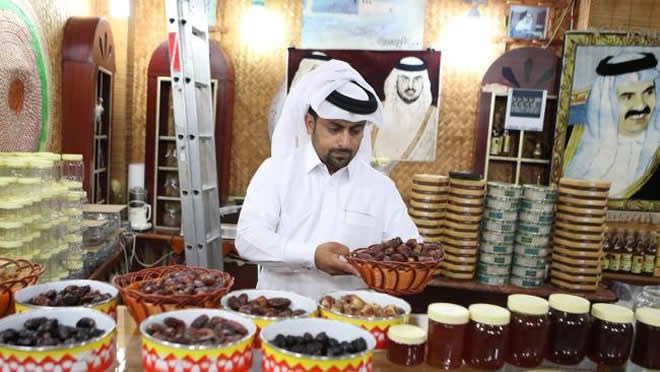
Sunday June 11, 2017
Rights group to seek compensation from Saudi Arabia and allies for 'collective punishment and international crimes’.
A man selling dates and honey stands in Doha shop.
A Qatari rights group says it will take legal action against Saudi Arabia, the United Arab Emirates (UAE) and Bahrain after receiving hundreds of complaints by citizens affected by a blockade imposed by the three Arab states on the country.
Qatar's National Human Rights Committee (NHRC) on Saturday said it was working to hire an international law firm to address damages the blockade has caused citizens of the Gulf Cooperation Council (GCC).
The moves by the Gulf states against Qatar amount to a "collective punishment and international crime", NHRC Chairman Ali bin Smaikh Al Marri said at a press conference.
Saudi Arabia, Egypt, the UAE, Bahrain and other Arab states on Monday cut diplomatic ties with Qatar, accusing Doha of supporting "terrorism" - an accusation Qatar rejected as "baseless".
Qatari nationals were ordered to leave Saudi Arabia, Bahrain and the UAE within 14 days. Saudi, UAE and Bahraini citizens were also given the same timeframe to leave Qatar.
Al Marri said the NHRC held a meeting with Qatar Lawyers' Association and asked them to prepare the case files for the 700 complaints the committee received.
One case highlighted by Al Marri involved that of a man with Qatari citizenship who had been living in the UAE for 20 years.
"When he was deported from the UAE and came to Qatar without any housing, without any work, without any income, it really is a human rights situation," he told reporters.
Al Marri added that the international law firm will sue and request damages from those countries at national courts.
Hundreds of mixed-citizenship Qatari couples are facing the grim prospect of being split from their families.
A number of these families have told Al Jazeera about the uncertainty and hardship they are facing due to the crisis.
Earlier this week, Wafa Al-Wazeedi, a Qatari, whose children have Bahraini citizenship, told Al Jazeera that her family is "lost".
"We may be separated from our children and return back to Bahrain for no reason," she said.
Wazeedi's son added that he feels Qatar is more his home than Bahrain.
"I have only been there four times in my life. If I am required to give up my Bahraini passport to live [in Qatar], I would be more than glad to do that. This country has given me more than my own country has given me," he said.
Separately, Amnesty International criticised the blockade being imposed on Qatar, saying it is "splitting up families and destroying people's' livelihoods and education".
"For potentially thousands of people across the Gulf, the effect of the steps imposed in the wake of this political dispute is suffering, heartbreak and fear," James Lynch, Deputy Director of Amnesty International's Global Issues Programme, said in a statement.
Saudi Arabia, Bahrain and the United Arab Emirates have all announced hotlines to help families with Qatari members, their official news agencies reported on Saturday and Sunday.
The three countries' news agencies did not make clear what services the hotline would provide.
Qatari Foreign Minister Mohammed bin Abdulrahman Al Thani has repeatedly said the blockade of his country is in violation of international law.
"Such measures have never been exercised before enemy states, let alone a friendly and a sister state in the Gulf Cooperation Council," he said on a recent trip to Germany.
Legal action to protect humanitarian work
Qatari organisations have also said they are prepared to take legal action against the Gulf states over a list published by Saudi Arabia and its allies on Thursday accusing 59 individuals and 12 groups with links to Qatar, including several high-profile charities, of being "linked to terror".
Qatar has rejected the list, which includes charitable organisations, saying that it "once again reinforces baseless allegation that hold no foundation in fact".
Qatar's Regulatory Authority for Charitable Activities (RACA) condemned the accusations in a statement, adding it would take legal action to protect the humanitarian work charities in Qatar do.
On Friday, the United Nations humanitarian agency, said it is not bound by the "terror list", adding it "has over the years built strong partnerships with these organisations [listed] based on shared humanitarian principles, which are strictly non-political".
Qatar Charity, an accused organisation and Qatar's largest NGO, has worked extensively with the UNHCR, UNICEF, the World Food Programme, Oxfam, CARE, and USAID.